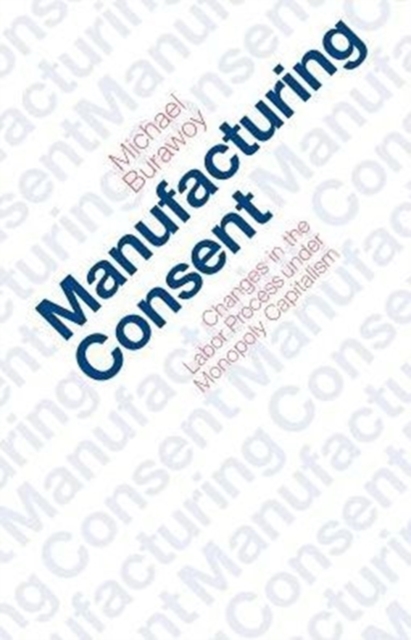Manufacturing Consent: Changes in the Labor Process Under Monopoly Capitalism

Manufacturing Consent: Changes in the Labor Process Under Monopoly Capitalism
Since the 1930s, industrial sociologists have tried to answer the question, Why do workers not work harder? Michael Burawoy spent ten months as a machine operator in a Chicago factory trying to answer different but equally important questions: Why do workers work as hard as they do? Why do workers routinely consent to their own exploitation? Manufacturing Consent, the result of Burawoy's research, combines rich ethnographical description with an original Marxist theory of the capitalist labor process. Manufacturing Consent is unique among studies of this kind because Burawoy has been able to analyze his own experiences in relation to those of Donald Roy, who studied the same factory thirty years earlier. Burawoy traces the technical, political, and ideological changes in factory life to the transformations of the market relations of the plant (it is now part of a multinational corporation) and to broader movements, since World War II, in industrial relations.
PRP: 210.80 Lei
Acesta este Prețul Recomandat de Producător. Prețul de vânzare al produsului este afișat mai jos.
189.72Lei
189.72Lei
210.80 LeiIndisponibil
Descrierea produsului
Since the 1930s, industrial sociologists have tried to answer the question, Why do workers not work harder? Michael Burawoy spent ten months as a machine operator in a Chicago factory trying to answer different but equally important questions: Why do workers work as hard as they do? Why do workers routinely consent to their own exploitation? Manufacturing Consent, the result of Burawoy's research, combines rich ethnographical description with an original Marxist theory of the capitalist labor process. Manufacturing Consent is unique among studies of this kind because Burawoy has been able to analyze his own experiences in relation to those of Donald Roy, who studied the same factory thirty years earlier. Burawoy traces the technical, political, and ideological changes in factory life to the transformations of the market relations of the plant (it is now part of a multinational corporation) and to broader movements, since World War II, in industrial relations.
Detaliile produsului










